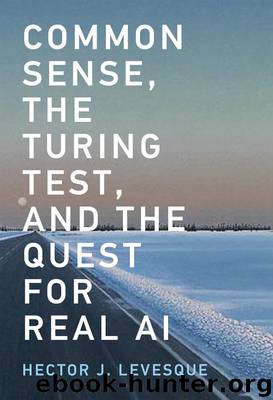Common Sense, the Turing Test, and the Quest for Real AI by Levesque Hector J.;

Author:Levesque, Hector J.;
Language: eng
Format: epub
Tags: artifical intelligence; technology; knowledge; behavior; mind; symbol processing; knowledge-based systems; machine learning
Publisher: MIT Press
Published: 2017-03-01T05:00:00+00:00
Street smarts by the book
As for book and street smarts, let us reconsider the example about hibernating bears and yellow lemons. We observed that we typically learn about the bears through language, but about the lemons through experience. In the terminology of this chapter, we have what amounts to book knowledge about bears, but street knowledge about lemons.
Looking at things this way, we can see that there is not much reason to denigrate one or the other form of knowledge. Is the knowledge that bears hibernate only for bookish types who sit at the front and enjoy crossword puzzles? Does the knowledge that lemons are yellow really kick ass because it was acquired through direct experience on the street?
It seems more plausible to say that to the extent that “street smarts kicks book smarts ass,” it is because of the subject matter more than how it is acquired. In other words, all other things being equal, we have very good reason to value practical knowledge that has direct bearing on the immediate decisions we need to make, over more abstract knowledge that may or may not ever find application.
Suppose you are traveling in Rome by taxi and you want to make a good impression on your fellow travelers. You are going to value more highly information about whether to tip a cab driver in Rome than one in Edinburgh. It does not matter whether you learn the local tipping custom by trial and error, by observing what the locals do, by being told what to do, or by reading about it in a travel guide. What makes you street smart here is that you know the local custom and behave accordingly on the street, even if that knowledge is the result of reading a book. (For the record, one does not normally tip a cab driver in Rome, but one does in Edinburgh.)
Of course there are things we know that we never expect to learn through language. If we have never seen a lemon before, language is not much help in conveying the shade of a typical lemon, except by reference to other objects of similar color. While Helen Keller may have known that lemons were yellow and so similar in color to straw and to school buses, she probably did not know what those differences in color were. Words fail us. (Interestingly, books can show us the shades—and one sample is enough!—they just cannot tell them to us in words.) It is not clear how crucial this extra bit of street knowledge is, but we do appear to have it.
On the other hand, as we have seen, there are very many things we know that we never expect to learn by direct experience. Only a small number of humans deal first hand with the hibernation of bears. The rest of us learn what we know through them. Much of our science, our mathematics, our technology is the same. For these crucial topics, we are in much the same position as Helen Keller.
Download
This site does not store any files on its server. We only index and link to content provided by other sites. Please contact the content providers to delete copyright contents if any and email us, we'll remove relevant links or contents immediately.
The Art of Thinking Clearly by Rolf Dobelli(10453)
Mindhunter: Inside the FBI's Elite Serial Crime Unit by John E. Douglas & Mark Olshaker(9319)
Change Your Questions, Change Your Life by Marilee Adams(7759)
Nudge - Improving Decisions about Health, Wealth, and Happiness by Thaler Sunstein(7692)
Mastermind: How to Think Like Sherlock Holmes by Maria Konnikova(7323)
The Power of Now: A Guide to Spiritual Enlightenment by Eckhart Tolle(5752)
Men In Love by Nancy Friday(5234)
Altered Sensations by David Pantalony(5093)
Factfulness: Ten Reasons We're Wrong About the World – and Why Things Are Better Than You Think by Hans Rosling(4731)
The Confidence Code by Katty Kay(4251)
Thinking in Bets by Annie Duke(4218)
Man and His Symbols by Carl Gustav Jung(4129)
The Worm at the Core by Sheldon Solomon(3486)
Why Buddhism is True by Robert Wright(3446)
Liar's Poker by Michael Lewis(3441)
Three Women by Lisa Taddeo(3422)
The Inner Life of Animals by Peter Wohlleben(3309)
Descartes' Error by Antonio Damasio(3270)
How Music Works by David Byrne(3259)
